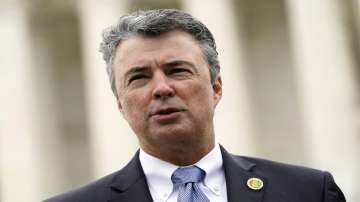US state seeks nation's first execution by making prisoner breathe only nitrogen
Alabama authorized nitrogen hypoxia in 2018 amid a shortage of drugs used to carry out lethal injections, but the state has not attempted to use it until now to carry out a death sentence.

The US state of Alabama sought to become the first state to execute a prisoner by making him breathe pure nitrogen. The Alabama attorney general’s office on Friday asked the state Supreme Court to set an execution date for death row inmate Kenneth Eugene Smith, 58. The court filing indicated Alabama plans to put him to death by nitrogen hypoxia, an execution method that is authorized in three states but has never been used. Nitrogen hypoxia is caused by forcing the inmate to breathe only nitrogen, depriving them of oxygen and causing them to die. Nitrogen makes up 78% of the air inhaled by humans and is harmless when inhaled with oxygen. While proponents of the new method have theorized it would be painless, opponents have likened it to human experimentation.
Alabama authorized nitrogen hypoxia in 2018 amid a shortage of drugs used to carry out lethal injections, but the state has not attempted to use it until now to carry out a death sentence. Oklahoma and Mississippi have also authorized nitrogen hypoxia, but have not used it. The disclosure that Alabama is ready to use nitrogen hypoxia is expected to set off a new round of legal battles over the constitutionality of the method. The Equal Justice Initiative, a legal advocacy group that has worked on death penalty issues, said Alabama has a history of “failed and flawed executions and execution attempts” and “experimenting with a never before used method is a terrible idea.”
“No state in the country has executed a person using nitrogen hypoxia and Alabama is in no position to experiment with a completely unproven and unused method for executing someone,” Angie Setzer, a senior attorney with the Equal Justice Initiative said. Alabama attempted to execute Smith by lethal injection last year, but called off the execution because of problems inserting an IV into his veins. It was the state’s second such instance within two months of being unable to put an inmate to death and its third since 2018. The day after Smith’s aborted execution, Gov. Kay Ivey announced a pause on executions to conduct an internal review of lethal injection procedures. The state resumed lethal injections last month.
Smith was one of two men convicted in the 1988 murder-for-hire slaying of a preacher’s wife. The Alabama attorney general argued it is time to carry out the death sentence. “It is a travesty that Kenneth Smith has been able to avoid his death sentence for nearly 35 years after being convicted of the heinous murder-for-hire slaying of an innocent woman, Elizabeth Sennett,” Attorney General Steve Marshall said Friday in a statement.
Alabama has been working for several years to develop the nitrogen hypoxia execution method, but has disclosed little about its plans. The attorney general’s court filing did not describe the details of the how the execution would be carried out. Corrections Commissioner John Hamm told reporters last month that a protocol was nearly complete. A number of Alabama inmates seeking to block their executions by lethal injection, including Smith, have argued they should be allowed to die by nitrogen hypoxia. Robert Grass, an attorney representing Smith, declined to comment Friday.
Sennett was found dead on March 18, 1988, in the home she shared with her husband on Coon Dog Cemetery Road in Alabama’s Colbert County. Prosecutors said Smith was one of two men who were each paid $1,000 to kill Sennett on behalf of her husband, who was deeply in debt and wanted to collect on insurance. The slaying, and the revelations over who was behind it, rocked the small north Alabama community. The other man convicted in the killing was executed in 2010. Charles Sennett, the victim’s husband and a Church of Christ pastor, killed himself when the investigation began to focus on him as a possible suspect, according to court documents.
(With inputs from AP)
ALSO READ | 'Grossly unfair trial': Saudi Arabia executes two Bahrainis on terrorism charges
ALSO READ | Iran publicly executes second detainee over alleged protest crime